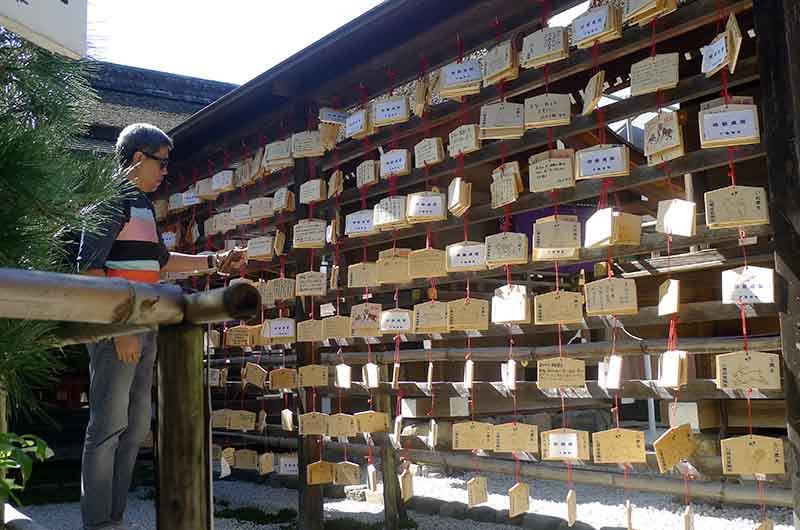The two sand cones lured me to the Shinto shrine of the Kamigamo (Upper Kamo Shrine). It was the first stop on Day 4 in Kyoto. It turned out there was more to the cones—it served a purification function for the shrine and to memorialize the holy trees that once served to welcome spirits. Apparently it has a twin shrine, the Shimogamo-jinja ("Lower Kamo Shrine").
Shimogamo, like the Kamogamo, is one of the most important and oldest shrines in Kyoto. It’s also a UNESCO World Heritage Site and one of the seventeen Historic Monuments of Ancient Kyoto.
The twin shrines, located about two kilometers apart on the outskirts of Heaian-kyo, were developed to prevent the infiltration of demons and predate Kyoto’s establishment as a Japanese capital in 794. Of the two shrines, the Shimogamo is older by about a hundred years.
Shimogamo Shrine is dedicated to the veneration of Tamayori-hime, the mother of Kamo Wakeikazuchi (the kami venerated in Kamogamo-jinja), and her father, Kamo Taketsunomi.
 |
| The Ro-mon, the tower gate |
 |
| Shimogamo shrine grounds, with the Kawai-jinja Mai-dono, or the Kawai Shrine Sacred Dance Hall (left) |
 |
| Shimogamo inner gate |
 |
| The Taikobashi bridge |
 |
| Ema by the Koto-sha, a small sub-shrine |
 |
| Mitarai-sha |
 |
| Aioi Shrine, a small complex dedicated to the god of marriage. It's located near the Romon gate |
Perhaps a big part of Shimogamo-jinja’s allure is its location. Surrounding it is the Tadasu no Mori, a primeval forest which was preserved during Kyoto’s modernization and survived through centuries of Kyoto’s revolts and wars, bouncing back to life after suffering damage.
Today, the forest spans over 12 hectares and is well protected by both national and international measures. The lush vegetation includes 600 year-old trees and rare Broadleaf trees.
Tadasu no mori is also referred to as “The Forest of Truth” or “The Forest Where Lies are Revealed”. Perhaps no secret is kept from the forest spirits when walking the approach, the long path that goes through the Tadau no mori to the main shrine.
On this path is where the annual yabusame (horseback archery) contest is held every May 3rd.
 |
| The walk to the main shrine passes through Tadasu no Mori, the "Forest Where Lies are Revealed". |
Inside the shrine are structures erected in 678 during the reign of the Emperor Tenmu. This shrine flourished along with the imperial culture during the reign of the Emperor Kanmu when Heian-kyo became the capital city of Japan.
Twin shrines checked off the list and on to the next stop for the day —the Ginkaku-ji, the Temple of the Silver Pavilion.
For lifestyle stories, visit www.ofapplesandlemons.com
Email me at jinggoysalvador@yahoo.com
Also published in the SunStar Davao newspaper.















CONVERSATION